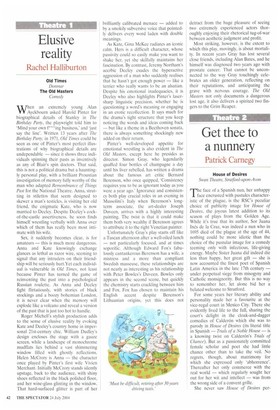Elusive reality
Rachel Halliburton
Old Times Donmat The Old Masters Comedy
When an extremely young Alan Ayckbourn asked Harold Pinter for biographical details of Stanley in The Birthday Parry, the playwright told him to 'Mind your own f***ing business,' and just say the line'. Written 13 years after The Birthday Party, in 1971, Old Times could be seen as one of Pinter's most perfect illustrations of why biographical details are undependable — since it shows three individuals spinning their pasts as inventively as any of Blair's spin doctors. That said, this is not a political drama but a hauntingly personal play, with a brilliant Proustian investigation of memory fully worthy of the man who adapted Remembrance of Things Past for the National Theatre. Anna, strutting in stilettos that seem designed to skewer a man's testicles, is visiting her old friend, the enigmatic Kate, who is now married to Deeley. Despite Deeley's cockof-the-castle assertiveness, he soon finds himself wrestling verbally with Anna over which of them has really been most intimate with his wife.
Sex, it suddenly becomes clear, is for amateurs — this is much more dangerous. Anna and Kate knowingly exchange glances as lethal as razor wire, seeming to signal that any intruders on their friendship will be seriously hurt.Yet each individual is vulnerable in Old Times, not least because Pinter has turned the game of reinventing the past into a psychological Russian roulette. As Anna and Deeley fight flirtatiously, with stories of black stockings and a boozy bohemian London, it is never clear when the memory will explode like a volcano and reveal a version of the past that is just too hot to handle.
Roger Michell's stylish production adds to the sense of elusive reality by evoking Kate and Deeley's country home in impersonal 21st-century chic. William Dudley's design encloses the stage with a gauze screen, while a landscape of monochrome mudflats lies behind a vast shimmering window tilled with ghostly reflections. Helen McCrory is Anna — the character once played by Pinter's first wife Vivien Merchant. Initially McCrory stands silently upstage, back to the audience, with shiny shoes reflected in the black polished floor, and her wine-glass glinting in the window. That hard-surfaced glitter is part of her brilliantly calibrated menace — added to by a smokily subversive voice that pointedly delivers every word laden with double meanings.
As Kate, Gina McKee radiates an iconic calm. Hers is a difficult character, whose passivity could so easily make you want to shake her, yet she skilfully maintains her fascination. By contrast, Jeremy Northam's acerbic Deeley exudes the hyperactive aggression of a man who suddenly realises that he hasn't got enough power — like a terrier who really wants to be an alsatian. Despite his emotional inadequacies, it is Deeley who also highlights Pinter's lasersharp linguistic precision, whether he is questioning a word's meaning or engaging in an erotic recollection. It says much for the drama's tight structure that you keep noticing the words and ideas coming back — but like a theme in a Beethoven sonata, there is always something shockingly new added on their return.
Pinter's well-developed appetite for emotional wrestling is also evident in The Old Masters, except here he presides as director. Simon Gray, who legendarily quaffed four bottles of champagne a day until his liver rebelled, has written a drama about the famous art critic Bernard Berenson, who once quipped, 'Consistency requires you to he as ignorant today as you were a year ago.' Ignorance and consistency both play crucial roles in an evening in Mussolini's Italy when Berenson's longterm associate, the art-dealer Joseph Duveen, arrives with a highly interesting painting. The twist is that it could make them both very wealthy if Berenson agrees to attribute it to the right Venetian painter.
Unfortunately Gray's play starts off like a Tuscan afternoon after a well-oiled lunch — not particularly focused, and at times soporific. Although Edward Fox's fabulously cantankerous Berenson has a wife, a mistress and a more than compliant Swedish masseuse, these relationships are not nearly as interesting as his relationship with Peter Bowles's Duveen. Bowles only appears in the second scene, but quickly the chemistry starts crackling between him and Fox. Fox has chosen to maintain his English accent despite Bererison's Lithuanian origins, yet this does not detract from the huge pleasure of seeing two extremely experienced actors thoroughly enjoying their rhetorical tug-of-war between aesthetic judgment and profit.
Most striking, however, is the extent to which this play, movingly, is about mortality. In recent years Gray has lost several close friends, including Alan Bates, and he himself was diagnosed two years ago with prostate cancer, That cannot be unconnected to the way Gray touchingly celebrates an older generation, reflecting on their reputations, and anticipating the grave with nervous courage. The Old Masters not only documents a dangerous lost age, it also delivers a spirited two fingers to the Grim Reaper.


























































 Previous page
Previous page